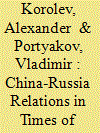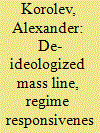|
|
|
Sort Order |
|
|
|
Items / Page
|
|
|
|
|
|
|
| Srl | Item |
| 1 |
ID:
160717


|
|
|
|
|
| Summary/Abstract |
Although not formal allies, China and Russia have steadily increased their strategic cooperation. However, crises and tensions in each other's areas of strategic interest continue to complicate each country's relations with the other and the rest of the international community. In this article we explore China's reaction toward major crises in the post-Soviet space (the Caucasus crisis of 2008 and the Ukraine crisis of 2014) and Russia's responses to the South China Sea dispute and show that they share many similarities. To explain the reaction patterns and better understand the nature of contemporary China-Russia relations, we apply a neoclassical realist framework, which helps assess the impact of both system-level and unit-level factors on great powers' behavior. The assessment demonstrates that the observed behavior pattern is an outcome of causal forces of different levels simultaneously pushing in different directions.
|
|
|
|
|
|
|
|
|
|
|
|
|
|
|
|
| 2 |
ID:
153566


|
|
|
|
|
| Summary/Abstract |
Once the primary method of revolutionary leadership, the “mass line”
has reemerged in today’s China as a method of public policy making.
Th is study explores and theorizes the implications of mass-line tactics
in policy making and state-society relations in contemporary China. At
the theoretical level, it argues that the de-ideologized mass line in
combination with traditional forms of nonmobilized participation can
enhance government responsiveness to the broader public interest. Th e
mass line can complement traditional forms of voluntary participation
in that it can allow better representation of social groups who regularly
fail to articulate their needs through the existing participation mechanisms
and who therefore remain outside of the policy-making process.
Empirically, the paper draws on existing Chinese studies, official
document analysis, and unstructured interviews with Chinese
academics to provide examples for the theoretical argument. Th is study
analyzes the workings of the mass-line tactics in China during the New
Healthcare Reform and the formation of the 12th Five-Year Plan. If
implemented not as a propaganda tool but as a mechanism of interest
articulation and aggregation, the mass line has the potential to off er
China alternative routes of democratization.
|
|
|
|
|
|
|
|
|
|
|
|
|
|
|
|
| 3 |
ID:
170169


|
|
|
|
|
| Summary/Abstract |
This research examines China’s official perspectives on, and interpretation of, U.S.-China-India relations by surveying official, quasi-official, and some most relevant scholarly publications. China’s official line has always emphasized the bilateral nature of the relationship between China and India fending off any third-party interference, including that from the United States. Neither Chinese leaders nor the regime’s official media outlets would speak of China–India relationship with a triangular framework (with a rare exception of the Russia–India–China triangle). In the context of the rapid evolvement of U.S.-India military cooperation, the Chinese official line remains unforthcoming about whether such developments have direct implication for China’s security or national interests. Chinese core official media has in fact minimized the popularization of the idea that containing China is the driving force behind any cooperation between India and the United States.
|
|
|
|
|
|
|
|
|
|
|
|
|
|
|
|
| 4 |
ID:
169247


|
|
|
|
|
| Summary/Abstract |
The deterioration of Russia-US relations as a consequence of the Ukraine crisis and growing tensions in US-China relations have given rise to the perception that China–-Russia relations are an actual or incipient alliance. However, the alliance elements in China-Russia relations have never been systematically defined and empirically assessed, which makes assessing alliance dynamics in these important bilateral relations difficult. This article develops and applies a set of empirical criteria for an alliance to define how closely the post-Cold War China-Russia military relations have approached the alliance condition. It demonstrates that China and Russia have created strong institutional foundations for an alliance, and now only minor steps are necessary for a formal and functioning military alliance to materialize. However, the occurrence of such steps is not yet guaranteed.
|
|
|
|
|
|
|
|
|
|
|
|
|
|
|
|
| 5 |
ID:
164834


|
|
|
|
|
| Summary/Abstract |
This article attempts to advance the neoclassical realist framework by elaborating on the interaction between system-level and unit-level factors in the formation of states’ behavior. With an empirical focus on post-Cold War China–Russia relations, which represent the ambivalent combination of a consistently growing strategic entente and a simultaneous reluctance to form a full-fledged political-military alliance, this study establishes two major unit-level factors – differing economic models and negative historical memories – that create hurdles for alliance formation between the two countries. However, under greater systemic pressure from the US-led unipolarity, China’s and Russia’s state leaders have not only increased bilateral military-to-military cooperation but have begun to actively implement policies to deliberately transform, if not remove, the existing non-systemic hurdles. Therefore, the neoclassical realist framework can be understood and further tested as a dynamic interaction model in which the unit-level circumstances, while moderating the causal impact of the system, are themselves being transformed by the system via state policies, as is their impact on states’ foreign policy.
|
|
|
|
|
|
|
|
|
|
|
|
|
|
|
|
| 6 |
ID:
164679


|
|
|
|
|
| Summary/Abstract |
Although on the surface Russia remains distant and disengaged from the South China Sea (SCS) dispute, its comprehensive strategic partnership relations and large-scale arms deals with China and Vietnam—Russia's closest Asian allies but also major rival parties to the dispute—reveal that Moscow has strategic interests and goals that affect, directly or indirectly, the evolution of the dispute. Russia's ambivalent stance toward the dispute in the form of supporting both China and Vietnam is the manifestation of two different modes of great power behavior that unfold at different levels but happen to intersect in the SCS. One is systemic balancing, which is aimed at checking and blocking the strongest power in the system—the United States. The other is regional hedging, which combines engagement and containment and helps to avoid taking one side at the obvious expense of another. These two different modes of great power behavior coexist in Russia's behavior toward the SCS. Untangling the two levels sheds light on the essence and evolution of Russia's policies in the region, which have created a win-win situation, however imperfect, for China and Vietnam and have contributed to the formation of a more manageable negotiation environment.
|
|
|
|
|
|
|
|
|
|
|
|
|
|
|
|
| 7 |
ID:
143536


|
|
|
|
|
| Summary/Abstract |
This research applies a neoclassical realist framework to explore the causes and consequences of Russia’s recent “reorientation to Asia.” Based on an analysis of publications and fieldwork conducted in Russia, the paper examines both the international systemic and the Russian domestic factors that have contributed to this important change in Russia’s foreign policy. At the system level, Russia’s turn to Asia can be understood as a part of its longer campaign of balancing against American unipolar domination. issue_image_89_1_Korolev_Russia in the EastAt the unit level, economic demands to develop Russia’s eastern territories, together with the complex socio-political processes of post-Soviet identity formation, generated a political environment that was conducive to Asia-oriented policies. Russia’s reorientation to Asia implies not only comprehensive strategic cooperation with specific Asian powers, such as China, South Korea, or Japan, but also a “reinvention” of Russia as a Eurasian power. Given Russia’s cross-continental spread and economic and military capabilities, its reorientation to Asia may have significant implications for the balance of power in the current world system.
|
|
|
|
|
|
|
|
|
|
|
|
|
|
|
|
| 8 |
ID:
149798


|
|
|
|
|
| Summary/Abstract |
There have been noticeable attempts in recent International Relations scholarship to introduce the concept of ‘hedging’ as an alternative to ‘balancing’ and ‘bandwagoning’. This article argues that to be useful in the analysis of great power politics hedging should not be understood as an alternative to balancing or bandwagoning, but as a phenomenon of a different order. In contrast to balancing or bandwagoning, which describe great powers’ behaviour in response to system-level forces, hedging denotes interstate political matters unfolding at the unit and regional levels. The analysis of China–Russia relations supports this understanding. Both great powers are strategically on the same page with respect to resisting unipolarity and other global political issues, but their strategies often diverge with respect to purely bilateral relations, or policies in their salient geographic environments. This two-level nature of China–Russia relations—balancing the Unipole while hedging towards one another—suggests that their global strategic behaviour and regional bilateral interactions are subject to different causal forces that push in different directions. The former is a reaction to system-level pressure, whereas the latter is a result of multiple unit-level factors. Therefore, in the analysis of great power relations, hedging occupies a specific rung on the ladder of levels of analysis.
|
|
|
|
|
|
|
|
|
|
|
|
|
|
|
|
| 9 |
ID:
160639


|
|
|
|
|
| Summary/Abstract |
The beginning of the twenty-first century has witnessed the emergence of balancing responses to the US hegemony, among which Russia’s foreign policies stand out as corresponding to what is understood as ‘hard balancing.’ Why is the United States being balanced against? This paper categorizes the existing theories of non-balancing into six conditions that together guarantee the absence of balancing and demonstrates that the current unipolar system can satisfy only one of them. This eases the systemic constraints and makes balancing possible. The paper then presents three cases of balancing with reference to President Putin’s foreign policy. It argues that even though in terms of relative military capabilities unipolarity still holds, the emergence of counter-hegemonic balancing is indicative of important changes in the nature of post-Cold War American domination.
|
|
|
|
|
|
|
|
|
|
|
|
|
|
|
|
|
|
|
|
|